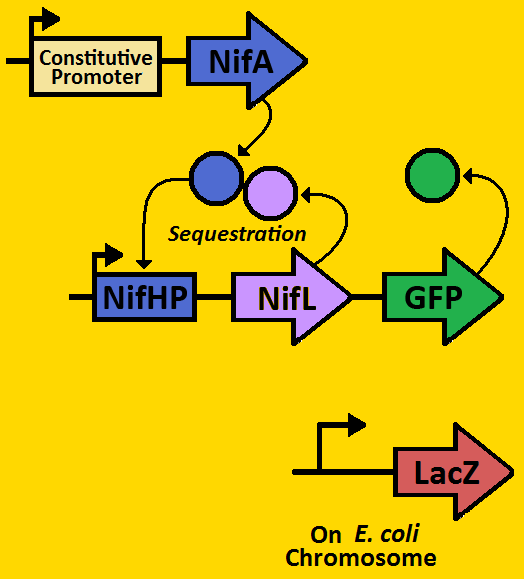Team:Michigan
From 2008.igem.org
| Line 9: | Line 9: | ||
= '''<font color=dodgerblue size=6>''Beauty''... and the CLOCK</font>''' = | = '''<font color=dodgerblue size=6>''Beauty''... and the CLOCK</font>''' = | ||
| - | ==<B>Circadian Clocking... in E. Coli!</B>== | + | ==<B><font size=4>Circadian Clocking... in E. Coli!</font></B>== |
The human body's "clock" regulates the daily cycles of many physiological and metabolic processes, such as the sleep/wake cycle and feeding rhythms. It is controlled by the interplay of numerous molecular factors that orchestrate complex feedback loops and processes that are fundamentally mediated by gene expression and the events that follow it. We are working on constructing a synthetic clock, affectionately deemed "The Sequestilator," that is analogous to the mammalian clock. Our clock consists of two parts: an activator with constitutive expression and a promoter that drives the production of a repressor that binds and "sequesters" the activator away from the promoter. While intuitively it seems that this system may reach a steady state rather than oscillate, simulations have shown that under certain rapid equilibrium and tight binding conditions, this circuit does exhibit oscillations. We are currently involved in building and testing of this device. | The human body's "clock" regulates the daily cycles of many physiological and metabolic processes, such as the sleep/wake cycle and feeding rhythms. It is controlled by the interplay of numerous molecular factors that orchestrate complex feedback loops and processes that are fundamentally mediated by gene expression and the events that follow it. We are working on constructing a synthetic clock, affectionately deemed "The Sequestilator," that is analogous to the mammalian clock. Our clock consists of two parts: an activator with constitutive expression and a promoter that drives the production of a repressor that binds and "sequesters" the activator away from the promoter. While intuitively it seems that this system may reach a steady state rather than oscillate, simulations have shown that under certain rapid equilibrium and tight binding conditions, this circuit does exhibit oscillations. We are currently involved in building and testing of this device. | ||
| - | ==<B>Topology</B>== | + | ==<B><font size=4>Topology</font></B>== |
<div align=center>[[Image:New_full_topology_-_gold.png]]</div> | <div align=center>[[Image:New_full_topology_-_gold.png]]</div> | ||
Revision as of 07:17, 29 October 2008
|
|---|
|
Beauty... and the CLOCKCircadian Clocking... in E. Coli!The human body's "clock" regulates the daily cycles of many physiological and metabolic processes, such as the sleep/wake cycle and feeding rhythms. It is controlled by the interplay of numerous molecular factors that orchestrate complex feedback loops and processes that are fundamentally mediated by gene expression and the events that follow it. We are working on constructing a synthetic clock, affectionately deemed "The Sequestilator," that is analogous to the mammalian clock. Our clock consists of two parts: an activator with constitutive expression and a promoter that drives the production of a repressor that binds and "sequesters" the activator away from the promoter. While intuitively it seems that this system may reach a steady state rather than oscillate, simulations have shown that under certain rapid equilibrium and tight binding conditions, this circuit does exhibit oscillations. We are currently involved in building and testing of this device. Topology |
|---|
|
More information about our team and previous iGEM projects can be found on our team wiki: HERE. |
|---|
 "
"


